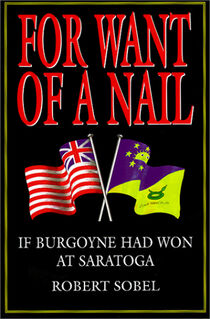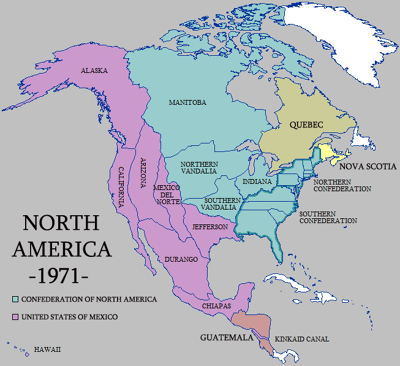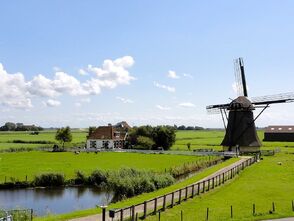(→Featured Article: 1853 Grand Council elections) |
No edit summary |
||
| Line 52: | Line 52: | ||
{{w:SciFiAlliance}}<br /> |
{{w:SciFiAlliance}}<br /> |
||
==[[Featured Article]]== |
==[[Featured Article]]== |
||
| − | [[File: |
+ | [[File:Netherlands.jpg|thumb|294x294px|Friesland, Netherlands]] |
| + | The '''Netherlands''' is a nation in western Europe that developed out of the Duchy of Burgundy in the fifteenth century. Under the Holy Roman Emperor Charles V, the lands of the modern-day Netherlands and Belgium were united into the Seventeen Provinces. |
||
| − | The '''1853 Grand Council elections''' took place in February 1853, for the purpose of choosing the [[Third Grand Council]] of the [[Confederation of North America]]. The elections were the first to return a majority of seats to the [[Conservative Party]], which had been in opposition since the [[Second Britannic Design]] had gone into effect ten years earlier. |
||
| + | In 1568 the mostly Protestant northern half of the Seventeen Provinces rose up against the rule of King Philip II of [[Spain]], beginning the Eighty Years' War. Eleven years later, the northern half of the Seventeen Provinces formed the Union of Utrecht, a mutual-defense pact that served as the foundation of the Netherlands. In 1581, the northern provinces declared their independence from the rule of Philip II. The war between the Dutch and the Spanish continued until 1648, when King Philip IV recognized Dutch independence in the Peace of Münster. The largely Catholic southern provinces remained under Spanish rule. |
||
| − | The elections were dominated by growing popular opposition to the ongoing [[Rocky Mountain War]]. The incumbent [[Governor-General]], [[Henry Gilpin]], chose not to run for another term, and the [[Liberal Party]] caucus in the [[Grand Council]] nominated [[Northern Confederation]] Councilman [[Bruce Harrison]] as their candidate for Governor-General. The Conservative Party caucus declined to nominate longtime party leader [[Willie Lloyd]] of the [[Southern Confederation]] due to his inconsistent stand on the war, and instead nominated [[Manitoba]] Councilman [[William Johnson]], who had opposed the war from the start. '''([[1853 Grand Council elections|read more]])''' |
||
| + | |||
| + | The Netherlands was one of three nations that agreed to form an arbitration panel in 1845 to mediate a border dispute between the [[Confederation of North America]] and the [[United States of Mexico]]. However, the panel never convened due to the last-minute withdrawal of Spain, and the border dispute led to the outbreak of the [[Rocky Mountain War]]. '''([[Netherlands|read more]])''' |
||
==Other AH Wikis== |
==Other AH Wikis== |
||
Revision as of 00:03, 2 April 2020
An encyclopedia of Robert Sobel's alternate history For Want of a Nail that anyone can edit!

For Want of a Nail
For Want of a Nail: If Burgoyne Had Won at Saratoga is one of the classic works of alternate history. In it, business historian Robert Sobel wrote about an alternate world where the American Revolution was unsuccessful. However, instead of writing a novel set in an alternate timeline, Sobel chose to write a history book from an alternate timeline. The result is a history of an alternate North American continent from 1763 to 1971, including all the scholarly apparatus of an academic work: footnotes, a bibliography, three appendices, a map, an index, a preface by the author (an alternate Robert Sobel), and a critique by Professor Frank Dana, a hostile historian.
The book's point of divergence from our own history is a British victory at the Battle of Saratoga in October 1777, leading to defeat for the American colonists in the American Revolutionary War, which is known in the alternate history as the North American Rebellion. Afterwards, the defeated colonies are reorganized into the Confederation of North America, a dominion of the British Empire that gradually gains complete autonomy over the next sixty years. Meanwhile, the defeated rebels leave the colonies to settle in northern Mexico, where they found the State of Jefferson. In 1820, Jefferson and Mexico merge to form the United States of Mexico. For Want of a Nail then follows the histories of these two North American nations as they interact with each other and with the rest of a changed world, down to the time of the book's publication in the early 1970s.

Like any history book, For Want of a Nail references thousands of people, places, events, and organizations, most of which are unique to the alternate history it describes. The Sobel Wiki exists to serve as an encyclopedia of this richly-detailed alternate world.
Although most of the articles are written from an in-universe point of view, they can also contain italicised information from the point of view of someone in our world (IOW).
For All Nails
In 2001, a number of alternate history enthusiasts at the soc.history.what-if Usenet newsgroup (including Sobel Wiki creator Johnny Pez) joined together in the For All Nails project: to extend the Sobel Timeline past its original 1971 terminus, and to correct the various errors, contradictions, and improbabilities that For Want of a Nail suffers from. The result was a series of over 350 Usenet posts, mostly narrative vignettes of life in the Sobel Timeline, but also including newpaper and magazine articles, letters, and vitavision transcripts. Dan McDonald, one of the participants, began archiving the posts at his website, but real life intervened, as it so often does, and the kebe.com archive remains incomplete. In order to remedy this deficiency, the Sobel Wiki includes a second archive of For All Nails posts here.
Popular CategoriesThese categories are probably the most interesting to first-time visitors. |
Recently Created PagesA list of the most recent pages created on the Sobel Wiki: |
Featured Article

Friesland, Netherlands
The Netherlands is a nation in western Europe that developed out of the Duchy of Burgundy in the fifteenth century. Under the Holy Roman Emperor Charles V, the lands of the modern-day Netherlands and Belgium were united into the Seventeen Provinces.
In 1568 the mostly Protestant northern half of the Seventeen Provinces rose up against the rule of King Philip II of Spain, beginning the Eighty Years' War. Eleven years later, the northern half of the Seventeen Provinces formed the Union of Utrecht, a mutual-defense pact that served as the foundation of the Netherlands. In 1581, the northern provinces declared their independence from the rule of Philip II. The war between the Dutch and the Spanish continued until 1648, when King Philip IV recognized Dutch independence in the Peace of Münster. The largely Catholic southern provinces remained under Spanish rule.
The Netherlands was one of three nations that agreed to form an arbitration panel in 1845 to mediate a border dispute between the Confederation of North America and the United States of Mexico. However, the panel never convened due to the last-minute withdrawal of Spain, and the border dispute led to the outbreak of the Rocky Mountain War. (read more)
Other AH Wikis
- Eric Flint Wiki
- Harry Turtledove Wiki
- S.M. Stirling Wiki
- Emberverse Wiki
- For All Time Wiki
- Submission Wiki
Latest activity
